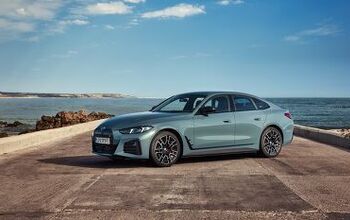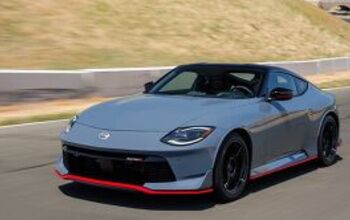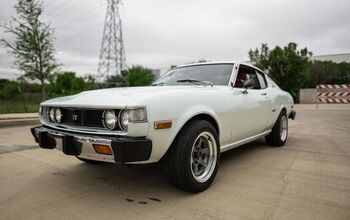Gas War: Antitrust Probe Opened Into Automakers Endorsing California Emissions Pact

The Justice Department has opened an antitrust probe into four automakers that formed a pact with California to compromise on tailpipe emissions, effectively circumventing federal regulators, last July.
Over the summer, Ford Motor Co., Honda Motor Co., BMW AG and Volkswagen Group announced a joint agreement with the California Air Resources Board to adhere to fueling standards slightly lower than Obama-era rules but still significantly higher than the Trump administration’s proposal from 2018. The Justice Department is seeking to determine whether or not that qualifies as a violation of federal competition laws.
While jointly adhering to a more-stringent standard over one that has yet to be finalized doesn’t really seem like it should be a problem, automakers cooperatively endorsing a new standard leaves room for interpretation. The companies could have said nothing and then simply maintained higher standards on their own. The Wall Street Journal reported on the investigation Friday morning, suggesting it was still in the early stages and was currently focusing on how we came to this juncture in the gas war.
Initially, automakers wanted the administration to lower the standards — with several auto executives heading to the White House to plead their case with President Trump almost immediately after his taking the office. This eventually resulted in the rollback proposal. However, California and a coalition of supportive states said they would only adhere to the Obama-era mandates — setting the stage for a split market in the U.S.
Hoping to avoid such an outcome, the industry began pleading with both sides for compromise. But the situation deteriorated quickly, with neither California nor federal regulators showcasing any desire to cooperate. By February of this year, White House officials terminated negotiations. Talks had been breaking down for months and it was presumed the administration would simply move ahead with its original rollback proposal and seek to end California’s ability to self-regulate — an issue the state previously said it would defend in court if need be. Congressional hearings also failed to move things along, but did highlight exactly how contentious the situation had become.
In early July, a letter manifested. Signed by 23 governors, the document urged the Trump administration to reconsider the proposed rollback. Led, unsurprisingly, by California Governor Gavin Newsom, the letter suggests a “common-sense approach” to national requirements with an emphasis on rising standards. Later that month, the four automakers openly endorsed the proposed compromise, saying they’d voluntarily back the Californian standard. While little more than a promise that could be easily broken later, it was enough to create a blip on the Justice Department’s radar.
We’ve been following the gas war since day one and it’s only grown uglier. While we can’t say how the anti-trust probe will progress, it’s not encouraging. Any prospect of compromise seems long gone at this point, with litigation being the probable pathway forward.
[Image: Nithid Memanee/Shutterstock]

A staunch consumer advocate tracking industry trends and regulation. Before joining TTAC, Matt spent a decade working for marketing and research firms based in NYC. Clients included several of the world’s largest automakers, global tire brands, and aftermarket part suppliers. Dissatisfied with the corporate world and resentful of having to wear suits everyday, he pivoted to writing about cars. Since then, that man has become an ardent supporter of the right-to-repair movement, been interviewed on the auto industry by national radio broadcasts, driven more rental cars than anyone ever should, participated in amateur rallying events, and received the requisite minimum training as sanctioned by the SCCA. Handy with a wrench, Matt grew up surrounded by Detroit auto workers and managed to get a pizza delivery job before he was legally eligible. He later found himself driving box trucks through Manhattan, guaranteeing future sympathy for actual truckers. He continues to conduct research pertaining to the automotive sector as an independent contractor and has since moved back to his native Michigan, closer to where the cars are born. A contrarian, Matt claims to prefer understeer — stating that front and all-wheel drive vehicles cater best to his driving style.
More by Matt Posky
Latest Car Reviews
Read moreLatest Product Reviews
Read moreRecent Comments
- Corey Lewis It's not competitive against others in the class, as my review discussed. https://www.thetruthaboutcars.com/cars/chevrolet/rental-review-the-2023-chevrolet-malibu-last-domestic-midsize-standing-44502760
- Turbo Is Black Magic My wife had one of these back in 06, did a ton of work to it… supercharger, full exhaust, full suspension.. it was a blast to drive even though it was still hilariously slow. Great for drive in nights, open the hatch fold the seats flat and just relax.Also this thing is a great example of how far we have come in crash safety even since just 2005… go look at these old crash tests now and I cringe at what a modern electric tank would do to this thing.
- MaintenanceCosts Whenever the topic of the xB comes up…Me: "The style is fun. The combination of the box shape and the aggressive detailing is very JDM."Wife: "Those are ghetto."Me: "They're smaller than a Corolla outside and have the space of a RAV4 inside."Wife: "Those are ghetto."Me: "They're kind of fun to drive with a stick."Wife: "Those are ghetto."It's one of a few cars (including its fellow box, the Ford Flex) on which we will just never see eye to eye.
- Oberkanone The alternative is a more expensive SUV. Yes, it will be missed.
- Ajla I did like this one.


































Comments
Join the conversation
The issue is not the President the issue is the possible loss of the California market and the possibility of losing the market of the 23 states that support California's standards. Additionally not meeting stricter standards means not complying with the upcoming Western Europe standards. As a manufacturer do you want to have a variety of standards to have to comply with or do you want more standard regulations which is spread over more units thus lowering manufacturing costs. This is less about Trump and more about future standards that all manufacturers have to comply with long after Trump is out of office. Long term planning instead of short term.
"But the situation deteriorated quickly, with neither California nor federal regulators showcasing any desire to cooperate." Let's be honest though, this isn't really true. As has been made clearer and clearer by subsequent events, the Trump administration has been incredibly unreasonable all along while California is open to a reasonable compromise.